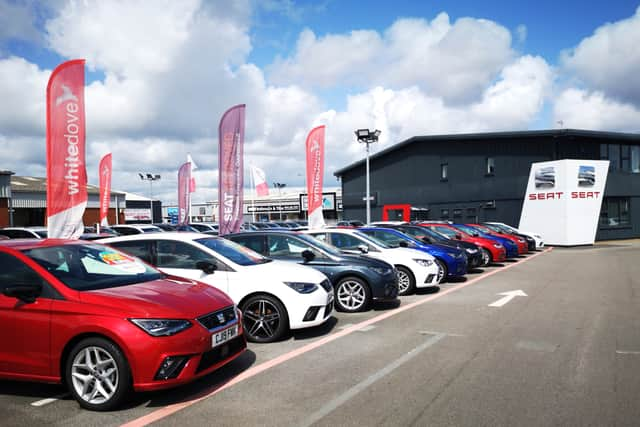Used car buying advice: experts’ checklist and the questions to ask when buying a secondhand car
and live on Freeview channel 276
The used car market is enjoying a boom at the moment as the new car segment continues to recover from two difficult years.
Used prices are high as demand for secondhand models is driven up by a shortage of new cars and an increase in the number of drivers cutting back on their spending in light of the tough economic climate.
Advertisement
Hide AdAdvertisement
Hide AdDespite rising interest in used cars, new research suggests the majority of drivers are still in the dark about what to do when buying one. A survey by online seller Motorpoint found 59% of drivers aren’t confident when it comes to buying a car, 69% don’t know what to look out for and less than a quarter (23%) know what checks to carry out before agreeing to buy a car.
Motorpoint’s driving expert Tim Rodie comments: “Buying a car is a big decision so it isn’t surprising that there could be some apprehension when looking to upgrade your vehicle.For any motorist that doesn’t feel confident when it comes to buying their next car, it’s worth taking some time to familiarise yourself with the process so you know exactly what to expect.”
With that in mind, we spoke to Tim and Mark Oakley, director of AA Cars to get the inside line on how to make sure you’re properly prepared when buying a used car.
Buy from a dealer
As a rule, used cars sold by private sellers will be cheaper than those from an official dealer. However, buying privately offers you no protection if there’s something wrong with the car.
Advertisement
Hide AdAdvertisement
Hide AdMark explains: “If you buy from a private seller you are not protected by the Consumer Rights Act. Dealerships must honour their responsibilities under the Act to offer a repair, replacement or some money back if a fault comes to light in the first six months after purchase — as long as the problem was present when you bought the car. Look out for dealerships partnered with independent third parties, which can suggest they are going the extra mile to offer good customer service.”


There are other advantages to using a dealer, too. Dealers may have a selection of similar cars for you to compare at one time and offer aftersales support such as warranties.
Tim advises that if you have a particular dealer in mind, it’s worth checking online reviews to get a feel for what to expect or whether to avoid them.
Do your research
Before heading out to view and test drive anything, it’s important to know what you’re looking for. Whether that’s a specific model or simply a car that meets all your requirements and has all the features you want.
Advertisement
Hide AdAdvertisement
Hide AdMark says: “Conducting research online is a good place to start, as you can find the makes and models you are interested in and compare the different prices from nearby dealerships. As well as helping you narrow down your choices, you’ll be able to work out the average price for the car you are interested in at different ages and mileages. This will stand you in good stead if you see a car being offered at a surprisingly low price – as this might signal a potential problem with the vehicle.
Tim adds: “It’s worth doing some research so you can work out the type of vehicle you are looking for and what features are most important for you. It’s important to remember that you can’t customise used cars like you could if you bought brand new. So having a clear idea of any non-negotiable equipment and engine specs before you start looking is the best way to simplify the process and help you feel confident making a choice.”
Ask questions
Many people are nervous about asking questions when looking at a car - AA research suggests up to one in 10 fear quizzing a seller, rising to one in three among younger drivers. While it can be intimidating, it’s important to ask the right questions to build up an accurate picture of the car.


Tim advises making note of any questions before you go to view the car, adding: “You should never feel rushed or under pressure. Make sure you not only get answers to all your questions but that you are happy with what you’ve been told.
Advertisement
Hide AdAdvertisement
Hide Ad“There will be loads of questions that are specific to the model you’re looking at, but all car buyers should be checking about what warranty is being sold with the vehicle and when the next service is due.”
Other key questions according to Mark include getting details of the car's service history and asking whether the car has ever been in an accident or had any repairs. It's also worth asking how long the vehicle has been advertised for. The longer it has been on the market, the more likely you are to get a good discount.
Take a test drive
Online research and asking the right questions will only get you so far and it’s vital to test drive any potential purchase before parting with any money. Not only will a proper test drive confirm if the car is right for you and your needs but it can also highlight any potential problems, so be sure to check all the features and functions work and look out for anything that sounds or feels wrong.
Tim says: “Even if you’re confident that you’ve found the perfect car, it’s always worth doing a test drive to make sure the car meets your expectations. A test drive isn’t just a chance to make sure that you and your passengers will be comfortable in the car, it provides a great opportunity to check that everything is working as it should and that there are no issues that could have been overlooked.
Advertisement
Hide AdAdvertisement
Hide Ad“While driving, pay special attention to how the car’s controls feel and listen out for any unusual noises that could indicate internal issues that might not be immediately obvious.”
Get an inspection
While you can learn a lot from a car by test driving it, unless you’re mechanically minded, it is worth considering a professional inspection to make sure there aren’t any hidden problems. Mark advises: "Some dealerships have their vehicles independently inspected as standard by a third party such as AA Cars. If this is not available, you should consider organising your own independent inspection in advance of seeing or buying the car, it is often better to pay a relatively small amount for the inspection and find out a car has a problem than drive off in a vehicle that will need costly repairs in a few months’ time.”
Remember the paperwork
While the car’s outward appearance and condition are vital, it’s important not to forget about the paperwork as well. Checking this will help verify that the car is as described and that there aren’t any issues around its history or ownership.
Mark says: A lot of drivers still neglect to see a car’s MOT and service history before parting with their money. These documents help build up a picture of the vehicle’s history. Second-hand cars may have passed through many owners before they arrive in a forecourt, and you need to ensure that the documents tell a consistent story and match the vehicle.”
Advertisement
Hide AdAdvertisement
Hide AdCheck that the service history is at the level claimed by the advert and ensure that the mileage matches that on the odometer to ensure the car hasn’t been “clocked”. It is also worth using the DVSA’s MOT checker tool to examine the car’s past. This will help verify mileage and also give a snapshot of the car’s recent passes or failures and any advisories that need to be addressed.
It’s also worth getting a history check of any car you’re seriously considering. This will help you identify whether a car has previously been stolen, written off or damaged, or is still under finance or a loan.
Ask about warranty
If you are buying from a dealer, Tim advises checking what sort of warranty the car comes with. He says: “For new and nearly new cars, there’s a good chance they will still be under their manufacturer’s warranty. It’s always worth checking how long is left on the manufacturer warranty and factoring this is into your decision-making process.
“If you buy a used car from a retailer, you’ll usually get a short warranty included with your purchase – usually for the first three months. For long-term peace of mind, however, it’s worth adding an extended warranty, which can help you avoid unexpected repair bills if your car suffers a serious failure. If you can’t get additional warranty cover direct from where you bought the car, it’s worth exploring third-party options as older cars will inevitably require more maintenance to keep them running properly.
Advertisement
Hide AdAdvertisement
Hide Ad“You should be aware that even with a full-service history, if the car you are looking to buy has not been serviced at the right times – it may impact the validity of the manufacturer’s warranty. This is unusual but something car buyers should keep in mind.”
Negotiate
Lastly, even in a time when used car prices are strong, it doesn’t hurt to try to get a little money off the asking price. Mark comments: “You have nothing to lose from haggling. The worst that can happen is you’ll have to decide if you’re happy with the asking price.
“Most dealerships are open to some haggling over the price of used cars. You are in a much stronger position if you go armed with research and know how much the same vehicle is being offered at other dealerships. Another way to get more value is to negotiate for something extra. This can include asking for free servicing, an extended warranty, or even something practical for the car such as seat covers."
Comment Guidelines
National World encourages reader discussion on our stories. User feedback, insights and back-and-forth exchanges add a rich layer of context to reporting. Please review our Community Guidelines before commenting.
